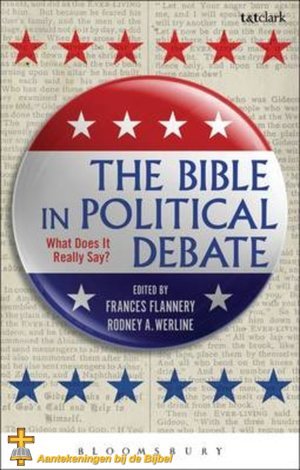
welke resulteren in allerlei aantekeningen.

People regularly use the Bible in social and political debates on a host of controversial social and political issues, including: abortion, euthanasia, stem-cell research, gay marriage, the death penalty, separation of church and state, family values, climate change, income distribution, teaching evolution in schools, taxation, school prayer, aid for the poor, and immigration. But can the Bible really be used in this way, and is it often used out of context in these major debates?
Table of contents
This book examines the use of the bible in popular debates and controversies, looking at what the Bible really says (or doesn't say) in its original historical contexts, and at what it has been argued to have said through history on these topics. The contributors take a non-confessional approach, rooted in non-partisan scholarship to show how specific texts have at times been distorted in order to support particular views. At the same time they show how the Bible can sometimes make for unsettling reading in the modern day. The key questions remain: what does the Bible really say? And who (if anyone) really 'owns' the text?
Recensie(s)
Modern American politicians often refer to Scripture in speeches and in support of policy, and they are rarely fact-checked by the experts. In this accessible, vibrant collection of essays, nonpartisan Biblical scholars of many creeds, including nonbelievers, examine what the Bible really says about family values, women's rights, homosexuality, abortion and even how to deal with man-caused climate change, and present some surprising answers to the vital question of how and whether the Bible can be the basis of the secular nation's public policy. Nina Burleigh, National Politics Correspondent, Newsweek Magazine The essays in this book confront head on without apology the complicated and thorny relationship that Americans have with the Bible from the first colonizers who saw themselves as the 'city on the hill' to the First Amendment and the establishment of a 'wall of separation' between church and state. It sets up for us a series of difficult questions. How could both slavers and abolitionists use the Bible to bolster their positions? How could the Bible be used to justify keeping women from the vote as well as supporting their bid to vote? How have people of opposite opinions used the Bible to argue that God is on their side? A powerful book that puts us at the center of the storm. April DeConick, Rice University, USA This fine book colors in what others have only sketched out - the Bible's constant presence beside and impact on the American experience. It is an insightful look at how the politics of the past are not so different from the politics of now, especially when viewed through the lens of the Bible. Kimberly Winston, Religion News Service This book is for readers of any faith or no faith who have ever heard politicians, pundits, or prophets justify their positions with appeals to scripture and wondered, 'Does the Bible really say that?' Here, Biblical scholars go about exploring that question in ways that are illuminating, surprising and provocative. Their essays combine top-notch research and much needed candor with sensitivity and wit. Mark Chancey, Southern Methodist University, USA
| Titel | The Bible in Political Debate What Does it Really Say? |
| Auteur | Frances Flannery |
| Uitgever | Bloomsbury |
| Jaar Verschenen | 2016 |
| Taal | en |
| Pagina's | pp. 208 |
| ISBN13 | 9780567666574 |
| Onderwerp | Evolutie, Homofilie, Huwelijk, Politiek, Slavernij, Slaaf, Vluchteling |

Zie de huisregels welk commentaar wordt opgenomen!